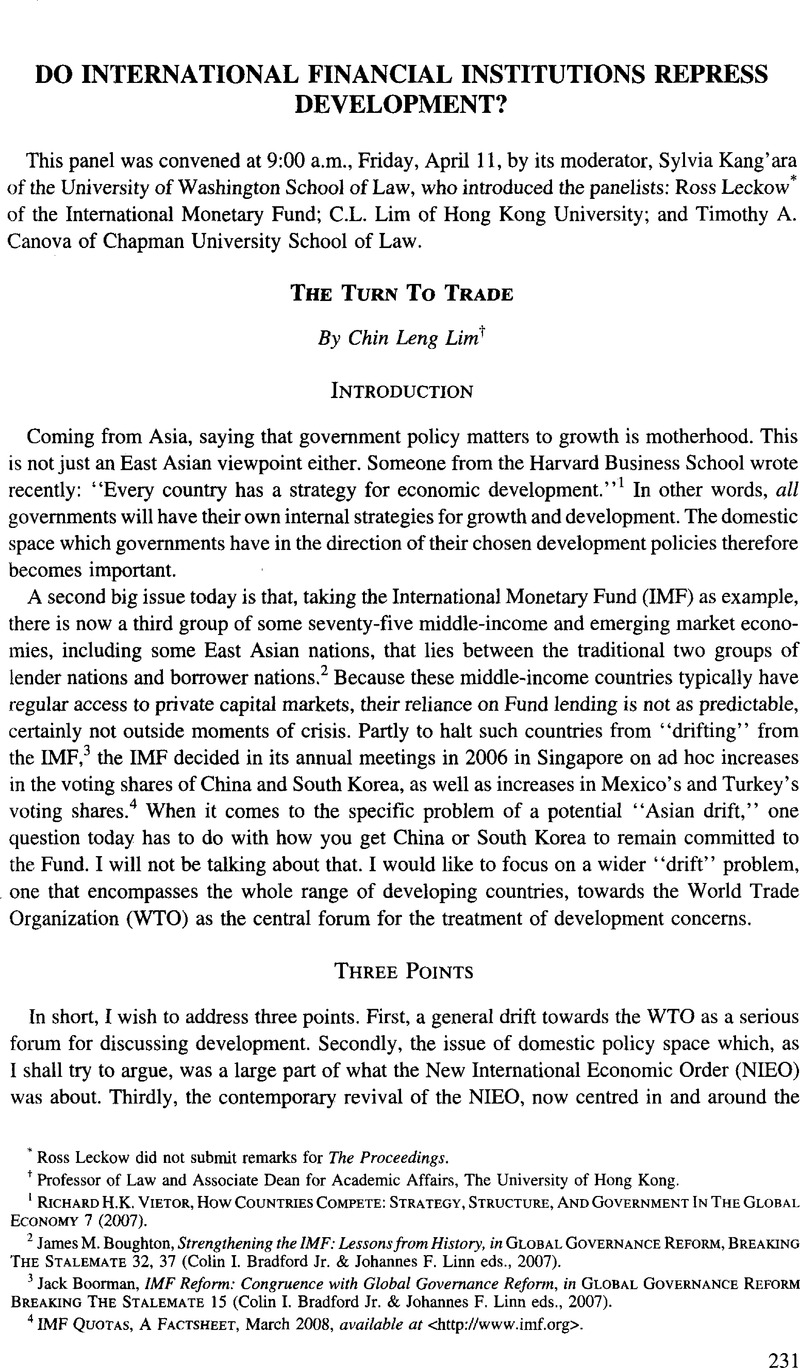No CrossRef data available.
Article contents
The Turn to Trade
Published online by Cambridge University Press: 28 February 2017
Abstract

- Type
- Do International Financial Institutions Repress Development?
- Information
- Copyright
- Copyright © American Society of International Law 2008
References
* Ross Leckow did not submit remarks for the Proceedings.
1 Vietor, Richard H.K., How Countries Compete: Strategy, Structure, and Government in the Global Economy 7 (2007)Google Scholar.
2 Boughton, James M. Strengthening the IMF: Lessons from History, in Global Governance Reform, Breaking the Stalemate 32, 37 (Bradford, Colin I. Jr. & Linn, Johannes F. eds., 2007)Google Scholar.
3 Boorman, Jack, IMF Reform: Congruence with Global Governance Reform, in Global Governance Reform Breaking the Stalemate 15 (Bradford, Colin I. Jr. & Linn, Johannes F. eds., 2007)Google Scholar.
4 Quotas, Imf, A Factsheet, March 2008, available at <http://www.imf.org>>Google Scholar.
5 Folsom, Ralph H. Et Al., International Business Transactions: A Problem-Oriented Approach 933 (9th ed. 2006)Google Scholar.
6 Sebastian Mallaby, The World’s Banker: A Story of Failed States, Financial Crises, and the Wealth and Poverty of Nations 36-37, 44 (2004).
7 Lim, C.L., Neither Peacocks nor Sheep: T. O. Elias and Postcolonial International Law, 21 Leiden J.I.L. 1 (2008)Google Scholar.
8 Agreement on Subsidies and Countervailing Measures art. 27.4 & Annex VII.
9 Appellate Body Report, United States - Tax Treatment for “Foreign Sales Corporations”, WT/DS108/AB/R (Mar. 20, 2000).
10 Alex Easson, Tax Incentives for Foreign Direct Investment 201, 204-206 (2004). See also the proposal by the African Group, WTO Doc. TN/CTD/W/3/Rev. 2.
11 Mallaby, supra note 6, at 45.
12 Protocol Amending the General Agreement on Tariffs and Trade to Introduce A Part IV on Trade and Development, Feb. 8, 1965, 572 U.N.T.S. 320.
13 Liang, Margaret, The Realpolitik of Multilateral Trade Negotiations from Uruguay to the Doha Round, 8 Sing. Y.B.I.L. 149, 151 (2004)Google Scholar.
14 Ngugi, Joel, The World Bank and the Ideology of Reform and Development in International Economic Development Discourse, 14 Cardozo J. Int’l & Comp. Law 313, 331, 339 (2006)Google Scholar.
15 See Ngairre Woods, The Globalizers: The IMF, The World Bank and Their Borrowers 54-6 (2006).
16 Ngugi, supra note 14, at 330.
17 Nancy Birdsall, The World Bank: Towards a Global Club, in Global Governance Reform, supra note 2, at 50.
18 Woods, supra note 15, at 47 et seq.
19 Einhorn, Jessica, The World Bank’s Mission Creep, 80 Foreign Aff. 22 (2001)CrossRefGoogle Scholar.
20 John Head, Seminar Paper at the University of Hong Kong, China: Public Finance and the International Financial Architecture (Mar. 27, 2008).
21 Einhorn, supra note 19.
22 Easson, supra note 10, at 100-103, 212 (2004).
23 Vietor, supra note 2, at 10-11; Douglas W. Arner, Financial Stability, Economic Growth and the Role of Law 16-22 (2007).
24 Linarelli, John, The WTO Agreement on Government Procurement and the UNCITRAL Model Procurement Law: A View from Outside the Region, 1 AJWH 317 (2006)Google Scholar.
25 Peter Sutherland Et Al., The Future of the WTO: Addressing Institutional Challenges in the New Millennium, Report by the Consultative Board to the Director-General Supachai Panitchpakdi (2004), ¶¶ 93-102.
26 Cf. U.N. Econ. & Soc. Council [ECOSOC], Comm’n on Human Rights, Effects of Structural Adjustment Policies and Foreign Debt on the Full Enjoyment of Human Rights, particularly Economic, Social and Cultural Rights, U.N. Doc. E/CN.4/2003/10 (Oct. 23, 2002) (prepared by Bernards Mudho).
27 Appellate Body Report, European Communities - Conditions for Granting of Tariff Preferences to Developing Countries, WT/DS246/AB/R (Apr. 7, 2004).
28 The Decision on Differential and More Favorable Treatment, Reciprocity, and Fuller Participation of Developing Countries, L/4903 (Nov. 28, 1979), GATT B.I.S.D. 26S/203 [hereinafter “Enabling Clause”].
29 Fischer, Stanley, The IMF and the World Bank at Fifty, in IMF Essays From A Time of Crisis: The International Financial System, Stabilization and Development 37, 62 (Fischer, Stanley ed., 2004)Google Scholar.
30 The term grandmotherly comes from John Maynard Keynes; quoted in Woods, supra note 15, at 25. He was referring to the United States position on the IMF.


